中国教育体系英文介绍
用英文介绍中国的教育系统作文
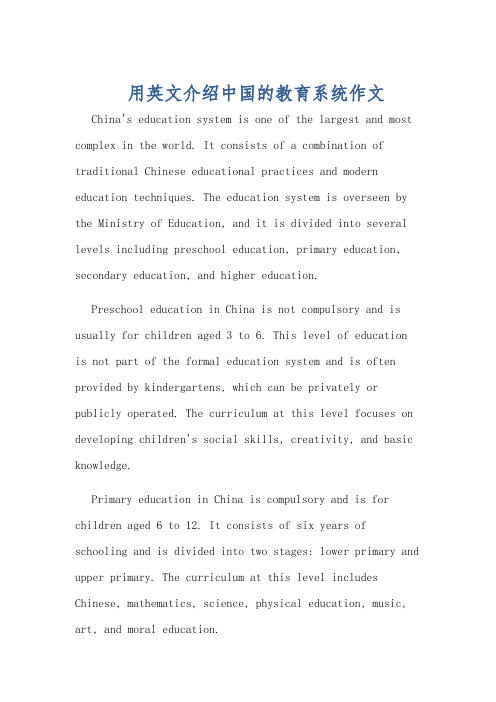
用英文介绍中国的教育系统作文China's education system is one of the largest and most complex in the world. It consists of a combination of traditional Chinese educational practices and modern education techniques. The education system is overseen by the Ministry of Education, and it is divided into several levels including preschool education, primary education, secondary education, and higher education.Preschool education in China is not compulsory and is usually for children aged 3 to 6. This level of education is not part of the formal education system and is often provided by kindergartens, which can be privately or publicly operated. The curriculum at this level focuses on developing children's social skills, creativity, and basic knowledge.Primary education in China is compulsory and is for children aged 6 to 12. It consists of six years of schooling and is divided into two stages: lower primary and upper primary. The curriculum at this level includes Chinese, mathematics, science, physical education, music, art, and moral education.Secondary education in China is divided into junior secondary and senior secondary education. Junior secondary education is for students aged 12 to 15 and consists of three years of schooling. The curriculum at this level is more comprehensive and includes Chinese, mathematics, English, physics, chemistry, biology, geography, history, politics, music, art, and physical education.Senior secondary education is for students aged 15 to 18 and consists of three years of schooling. At this level, students have the option to choose between academic and vocational tracks. The academic track prepares students for the National College Entrance Examination (NCEE), which is the most important examination for Chinese students as it determines their placement into higher education institutions.Higher education in China includes universities, colleges, and vocational schools. China has some of the top universities in the world and is a popular destination for international students. Higher education institutions in China offer a wide range of academic programs and research opportunities.Overall, China's education system has made significant progress in recent years. The government has investedheavily in education, and there have been improvements in access to education, infrastructure, and teaching quality. However, challenges such as regional disparities,curriculum reform, and the pressure of the NCEE continue to impact the system.中国的教育系统是世界上最大、最复杂的教育系统之一。
中国学校教育优点英文作文

中国学校教育优点英文作文Chinese School Education: Advantages and CharacteristicsChina's school education system has been attracting worldwide attention due to its unique features, rigorous academic standards, and outstanding student achievements. In this article, we will explore the advantages and characteristics of Chinese school education that make it distinctive from other systems.Emphasis on STEM EducationChinese schools place a strong emphasis on Science, Technology, Engineering, and Mathematics (STEM) education. STEM subjects are considered essential for the nation's future development, and students who excel in these fields are highly regarded in society. Schools provide students with comprehensive training in these subjects, from primary school to university, and students receive relevant academic support and resources to hone their skills.Rigorous Academic StandardsChinese schools have a reputation for their rigorous academic standards. Students are expected to work hard and demonstrate their academic proficiency through exams and assessments. The curriculum is designed to develop critical thinking, problem-solving, and analytical skills. Chinese schools have a strong focus on mastering the basics, and students are trained to memorize and recall vast amounts of information.Education as a Path to SuccessChinese society places a high value on education as a path to success. Many parents, students, and teachers view education as an opportunity to pursue upward social mobility and better career prospects. This cultural emphasis on education encourages students to strive for excellence and gives them strong motivation to succeed.Teaching and Learning StylesChinese schools follow a teacher-centered approach to teaching and learning. Teachers assume the role of authorities and expect students to listen, memorize, and follow instructions. Students are expected to seek knowledge, as opposed to discovering it themselves through inquiry, experimentation, and exploration.Learning through RepetitionChinese schools use a variety of teaching methods, but learning through repetition is a common feature across all levels of education. This method is designed to ingrain fundamental knowledge and skills deeply in students' minds. Students are encouraged to practice continuously and repeatedly until they master the material thoroughly.Respect for AuthorityChinese schools place a high value on respect for authority. Teachers, principals, and parents are viewed as figures of authority, and students are expected to listen and obey. This approach fosters discipline and a sense of order in the classroom, enabling students to focus on their studies.Enrichment ProgramsChinese schools provide students with a variety of enrichment programs to supplement their education. Extracurricular activities such as music, sports, and language classes are widely available. Theseprograms offer students opportunities to develop their talents, skills, and interests beyond academics.In conclusion, Chinese school education has several advantages and unique characteristics that set it apart from other systems. It emphasizes STEM education, rigorous academic standards, and a culture that values education as a pathway to success. Furthermore, teaching and learning styles are teacher-centered, and students learn through repetition. Finally, enrichment programs offer students additional opportunities to develop their talents and interests. These features make Chinese schools an attractive option for parents and students looking for quality education.。
九年制义务教育英文素材
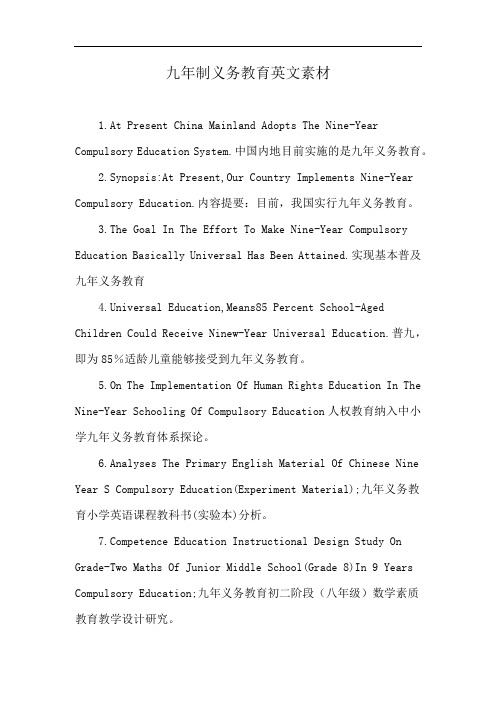
九年制义务教育英文素材1.At Present China Mainland Adopts The Nine-Year Compulsory Education System.中国内地目前实施的是九年义务教育。
2.Synopsis:At Present,Our Country Implements Nine-Year Compulsory Education.内容提要:目前,我国实行九年义务教育。
3.The Goal In The Effort To Make Nine-Year Compulsory Education Basically Universal Has Been Attained.实现基本普及九年义务教育4.Universal Education,Means85 Percent School-Aged Children Could Receive Ninew-Year Universal Education.普九,即为85%适龄儿童能够接受到九年义务教育。
5.On The Implementation Of Human Rights Education In The Nine-Year Schooling Of Compulsory Education人权教育纳入中小学九年义务教育体系探论。
6.Analyses The Primary English Material Of Chinese Nine Year S Compulsory Education(Experiment Material);九年义务教育小学英语课程教科书(实验本)分析。
petence Education Instructional Design Study On Grade-Two Maths Of Junior Middle School(Grade 8)In 9 Years Compulsory Education;九年义务教育初二阶段(八年级)数学素质教育教学设计研究。
中国教育特点英文介绍作文
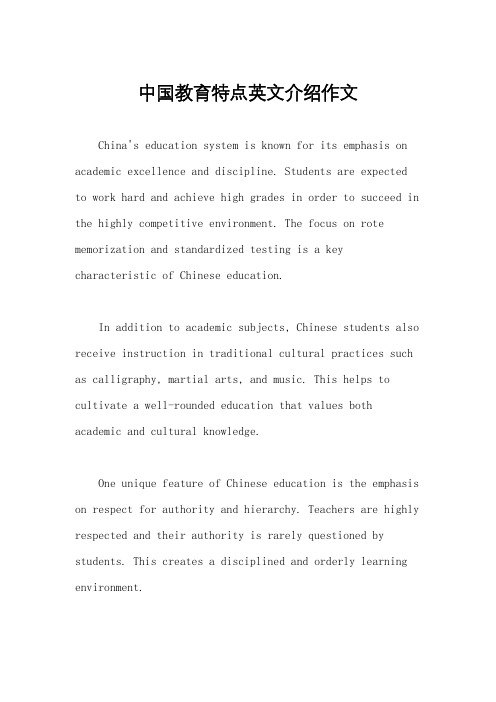
中国教育特点英文介绍作文China's education system is known for its emphasis on academic excellence and discipline. Students are expected to work hard and achieve high grades in order to succeed in the highly competitive environment. The focus on rote memorization and standardized testing is a key characteristic of Chinese education.In addition to academic subjects, Chinese students also receive instruction in traditional cultural practices such as calligraphy, martial arts, and music. This helps to cultivate a well-rounded education that values both academic and cultural knowledge.One unique feature of Chinese education is the emphasis on respect for authority and hierarchy. Teachers are highly respected and their authority is rarely questioned by students. This creates a disciplined and orderly learning environment.The use of technology in education is also becoming increasingly important in China. Many schools are incorporating digital tools and resources into the classroom to enhance learning and prepare students for the modern world.Another notable aspect of Chinese education is the high value placed on family involvement in a child's learning. Parents are deeply involved in their children's education, often hiring tutors and providing additional support outside of school hours.Overall, the Chinese education system is known for its rigor, discipline, and focus on academic achievement. It is a system that values tradition and cultural knowledge, while also adapting to the demands of the modern world.。
中国的教育体系英文作文

中国的教育体系英文作文英文:Education in China is a topic that interests both Chinese and foreigners alike. As a Chinese person who has gone through the education system, I have mixed feelings about it.On one hand, I appreciate the emphasis on hard work and discipline. In China, students are expected to study long hours and achieve high grades in order to succeed. This can be stressful, but it also instills a strong work ethic that can be useful later in life.On the other hand, I feel that the education system in China places too much emphasis on rote memorization andtest-taking skills. Students are often taught to simply regurgitate information rather than think critically or creatively. This can stifle innovation and limit students' potential.Another issue is the lack of emphasis onextracurricular activities and social skills. In China, students are often so focused on academics that they have little time for hobbies or socializing. This can lead to a lack of well-roundedness and difficulty in forming interpersonal relationships.Overall, I think that China's education system has both strengths and weaknesses. While it produces manyhardworking and successful individuals, it also has roomfor improvement in terms of fostering creativity, critical thinking, and social skills.中文:中国的教育体系是一个吸引中国人和外国人的话题。
中国的教育系统和教育理念英文文章
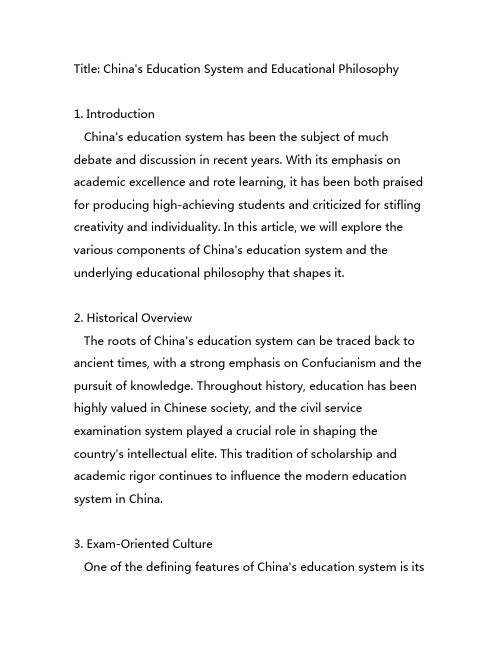
Title: China's Education System and Educational Philosophy1. IntroductionChina's education system has been the subject of much debate and discussion in recent years. With its emphasis on academic excellence and rote learning, it has been both praised for producing high-achieving students and criticized for stifling creativity and individuality. In this article, we will explore the various components of China's education system and the underlying educational philosophy that shapes it.2. Historical OverviewThe roots of China's education system can be traced back to ancient times, with a strong emphasis on Confucianism and the pursuit of knowledge. Throughout history, education has been highly valued in Chinese society, and the civil service examination system played a crucial role in shaping the country's intellectual elite. This tradition of scholarship and academic rigor continues to influence the modern education system in China.3. Exam-Oriented CultureOne of the defining features of China's education system is itsintense focus on exams and academic performance. From a young age, students are encouraged to excel in standardized tests, such as the Gaokao, which determines their future prospects for higher education and employment. This exam-oriented culture can create immense pressure on students and has been criticized for promoting a narrow definition of success.4. Rote Learning vs. Critical ThinkingAnother key aspect of China's education system is its reliance on rote learning and memorization. While this approach has its merits in terms of knowledge retention, it can hinder the development of critical thinking skills and creativity. Some educators argue that a shift towards more interactive and project-based learning methods is necessary to cultivate well-rounded individuals.5. Educational Reform EffortsIn recent years, the Chinese government has implemented various reforms aimed at modernizing the education system and promoting holistic development. Initiatives such as the "Double Reduction" policy and the expansion of vocational education seek to alleviate academic pressure and provide alternative pathways for students. These efforts reflect agrowing awareness of the need for a more balanced and inclusive approach to education.6. Confucian Values and Moral EducationCentral to China's educational philosophy is the imparting of Confucian values and moral education. The emphasis on filial piety, respect for authority, and social harmony permeates the curriculum and underpins the moral development of students. While these values are deeply ingrained in Chinese culture, there are ongoing debates about their relevance in a rapidly changing society.7. Personal ReflectionAs a writer, I have had the opportunity to observe and reflect on the intricacies of China's education system. While I recognize the strengths of its rigorous academic standards, I also see the need for a more balanced approach that nurtures students' individuality and creativity. I believe that a holistic education should encompass not only academic excellence but also emotional intelligence, practical skills, and ethical values.8. ConclusionIn conclusion, China's education system and educationalphilosophy are complex and multifaceted. While it has propelled the country to great academic achievements, it also faces challenges in adapting to the evolving needs of the 21st century. By critically examining its strengths and weaknesses, we can work towards a more inclusive and innovative educational landscape that empowers students to thrive in a globalized world.In this article, we have delved into the historical, cultural, and pedagogical aspects of China's education system and discussed the need for a more holistic approach to education. It is my hope that this exploration has provided valuable insights and a deeper understanding of this pivotal topic.。
中国教育系统英文介绍
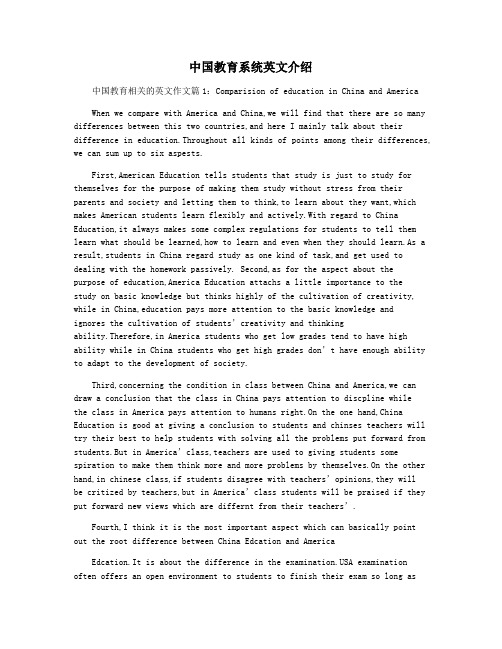
中国教育系统英文介绍中国教育相关的英文作文篇1:Comparision of education in China and AmericaWhen we compare with America and China,we will find that there are so many differences between this two countries,and here I mainly talk about their difference in education.Throughout all kinds of points among their differences, we can sum up to six aspests.First,American Education tells students that study is just to study for themselves for the purpose of making them study without stress from their parents and society and letting them to think,to learn about they want,which makes American students learn flexibly and actively.With regard to China Education,it always makes some complex regulations for students to tell them learn what should be learned,how to learn and even when they should learn.As a result,students in China regard study as one kind of task,and get used to dealing with the homework passively. Second,as for the aspect about thepurpose of education,America Education attachs a little importance to thestudy on basic knowledge but thinks highly of the cultivation of creativity, while in China,education pays more attention to the basic knowledge andignores the cultivation of students’creativity and thinkingability.Therefore,in America students who get low grades tend to have high ability while in China students who get high grades don’t have enough ability to adapt to the development of society.Third,concerning the condition in class between China and America,we can draw a conclusion that the class in China pays attention to discpline whilethe class in America pays attention to humans right.On the one hand,China Education is good at giving a conclusion to students and chinses teachers will try their best to help students with solving all the problems put forward from students.But in America’class,teachers are used to giving students some spiration to make them think more and more problems by themselves.On the other hand,in chinese class,if students disagree with teachers’opinions,they willbe critized by teachers,but in America’class students will be praised if they put forward new v iews which are differnt from their teachers’.Fourth,I think it is the most important aspect which can basically pointout the root difference between China Edcation and AmericaEdcation.It is about the difference in the A examinationoften offers an open environment to students to finish their exam so long asthey hand in their answer paper within the limiting time.But in China,when faced with an exam,chinese students always feel nervous as if there are beasts in front of them.And in China the purpose of examination is just to test out students’ability while American test aims to find the problem,its existing gaps in order to facilitate development. Fifth,about the difference on establishments of curricula and specialty,American education aims at adapting for society demand,they explicitly stipulate three bigfunctions:ducation’service for the establishment of specialty curriculum is to meet the social need and setup special curriculum or specialty which the society needs.In China’s universities,during quite long period of time ,the establishment of specialty curriculum lacks the change and could not follow socialdemand.In the latest few years,the majority of Chinese universities all started to pay attentio to the transformation and renewal of specialty curriculum so as to meet the need of society.Last,in general,the chinese children are not allowed to take part in the real social activities but in America the students can take part in every activity they want;that is to say,American students can choose activities to participate in by themseleves.It is said that the children in America start to take part in the real activity once they leave to school.For example,an 8-year-old boy can help other with washing clothes by which they can receive at least 8 dollars.Also,those children can play some musical instruments for the rich to earn some money which they usually use to hold some activities.All in all,in America ,children have all kinds of chances to contact with social environment.From the point of their view,they think education is equal to the life.But on the contrary,what chinese students only do is to bury themselves into study,which results in their shortage of outdoor ability even creativity to adapt the development of society in future.Through these kinds of comparison,maybe we can make sense of the reasons why America becomes so strong.A power of a country not only lies in its economy but also its education.That is to say, education is an important mean to creat more and more excellent people to make them devotetheir power to strengthen the country.By comparing,we have to admit that there have been many imperfections in our system of education.Our country needs improvement and the development and our economy needs talent people,so we can draw a conclusion through comparison that it is high time for ourcountry to improve our system of education and in the way of goingahead,imitation and innovation is in need.Only when our country modestly learn from other countries to take in their advantages in education can our country becomes really strong.中国教育相关的英文作文篇2:Education in ChinaIn China, children begin to go to school at the age of seven. It takes six years for them to finish primary school. In this stage, they are taught elementary knowledge in language and science, which lays the foundation for their furthereducation.After primary school, they go to junior middle school without having to pass any exams. Education at this levol is compvlsory. It lasts for three years, during which the children learn basie Chinese English, Mathematics, Physics and Chemistry.When the junior middle school education comes to an end, the students are screened by exams in two ways. those who expect to go to college may choose to enter senior middle school and those who want to work attend professional schools, The senior middle school education takes 3 years and the professional school 2 to 3 years.The senior middle school graduates have to take competitive exams before they enter college. The college education lasts 4 years. And you can continue to study or go to work.Such is the education system in China.中国教育相关的英文作文篇3:What’s wrong with the education in China?ProblemsWhen I was a little kid,I was very interested in English,history and math.And I learnt a lot of things from English cartoons and historical movies.Albert Einstein said,”Interest is the best teacher.”.I like acquiring knowledge that I am concerned about by myself.This situation changed when I was in senior one.At that time my English grade was good but I don’t like English class because my teacher always talked about grammar and vocabulary.One day I was asked to write down some newwords on the blackboard.I can’t finish it because I didn’t preview.After calss my teacher had a chat with me.I said I did’t like the way that teachers teached me.My teacher said,”I don’t like this way either but we teachers have to because of college entrance examination.This is the thing that youca n’t avoid.So you can’t do everything you like because you are a Chinese student.”After listening to her words,I realized I had to give up my interests and fought for a good college.Luckily I changed my mind so I can be in SEU,but unluckily we lost our interests. Some students didn’t changed and they couldn’t enter a good college.However,can we said they are bad students?Of course not.To get better grade,I swam in the sea of physics instead of history because we didn’t learn it.We also had some things in science that don’t need to learn because college entrance examination don’t check here.To be honest,I always fight for my grade,not interest.ReasonsMy purpose is not to attack college entrance examination.The reason that we have to lose our interests is enrolment rate.Every senior high school aspires higher enrolment rate so that they can get fame and earn moremoney.High schools compare with other schools. Also parents put pressure on teachers.If their children don’t get good grades,they will b lame these on teachers.Our teachers have to make leaders and parents satisfied,so they put pressure on us.This situation that grade is everything is not someone’s fault.I don’t mean that we should cancel exams.Instead,I think college entrance examination is the most fair way to compete.Now adults ask children,”How is your grades?”,not”What have you learnt?”.This reportsthat it’s a social problem.SolutionsI think that the government should pay more for children’s education and gradually eliminate education area differences.For example,Tsinghua University’s lowest criterion of examination in Beijing is much lower in Anhui.That means Anhui students have to pay much more effort to achieve the same goal.Also,parents need to know that grade is not everything and we should learn many things not only books.I believe ,with the development of China,the education in China will become real “quality education”.感谢您的阅读,祝您生活愉快。
英文中国教育体系――CHINESE EDUCATIONAL SYSTERM(优.选)
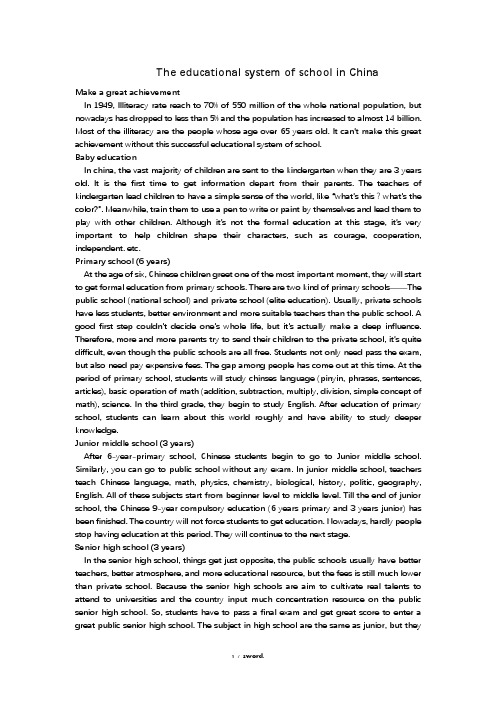
The educational system of school in ChinaMake a great achievementIn 1949, Illiteracy rate reach to 70% of 550 million of the whole national population, but nowadays has dropped to less than 5% and the population has increased to almost 14 billion. Most of the illiteracy are the people whose age over 65 years old. It can’t make this great achievement without this successful educational system of school.Baby educationIn china, the vast majority of children are sent to the kindergarten when they are 3 years old. It is the first time to get information depart from their parents. The teachers of kindergarten lead children to have a simple sense of the world, like “what’s this?what’s the color?”. Meanwhile, train them to use a pen to write or paint by themselves and lead them to play with other children. Although it’s not the formal education at this stage, it’s very important to help children shape their characters, such as courage, cooperation, independent. etc.Primary school (6 years)At the age of six, Chinese children greet one of the most important moment, they will start to get formal education from primary schools. There are two kind of primary schools——The public school (national school) and private school (elite education). Usually, private schools have less students, better environment and more suitable teachers than the public school. A good first step couldn’t decide one’s whole life, but it’s actually make a deep influence. Therefore, more and more parents try to send their c hildren to the private school, it’s quite difficult, even though the public schools are all free. Students not only need pass the exam, but also need pay expensive fees. The gap among people has come out at this time. At the period of primary school, students will study chinses language (pinyin, phrases, sentences, articles), basic operation of math (addition, subtraction, multiply, division, simple concept of math), science. In the third grade, they begin to study English. After education of primary school, students can learn about this world roughly and have ability to study deeper knowledge.Junior middle school (3 years)After 6-year-primary school, Chinese students begin to go to Junior middle school. Similarly, you can go to public school without any exam. In junior middle school, teachers teach Chinese language, math, physics, chemistry, biological, history, politic, geography, English. All of these subjects start from beginner level to middle level. Till the end of junior school, the Chinese 9-year compulsory education (6 years primary and 3 years junior) has been finished. The country will not force students to get education. Nowadays, hardly people stop having education at this period. They will continue to the next stage.Senior high school (3 years)In the senior high school, things get just opposite, the public schools usually have better teachers, better atmosphere, and more educational resource, but the fees is still much lower than private school. Because the senior high schools are aim to cultivate real talents to attend to universities and the country input much concentration resource on the public senior high school. So, students have to pass a final exam and get great score to enter a great public senior high school. The subject in high school are the same as junior, but theybecome much deeper and very difficult, students need to make great efforts to master them, they have to get up on 6 o’clock in morning and sleep in deep night and can hardly have spare time. All these efforts are for a final battle after 3 years——the national college entrance examination. It really can change the Chinese students’ fates.The higher education (University-Master-Doctor)Once you go through the single-plank bridge, you will have opportunity to study for professional and advanced knowledge in university. It will be a brand new life. Life and learn, never stop.最新文件---------------- 仅供参考--------------------已改成word文本--------------------- 方便更改。
- 1、下载文档前请自行甄别文档内容的完整性,平台不提供额外的编辑、内容补充、找答案等附加服务。
- 2、"仅部分预览"的文档,不可在线预览部分如存在完整性等问题,可反馈申请退款(可完整预览的文档不适用该条件!)。
- 3、如文档侵犯您的权益,请联系客服反馈,我们会尽快为您处理(人工客服工作时间:9:00-18:30)。
Primary education in China is mandatory and free of charge for all children between age 6 to age 12.The courses offered in primary schools are Chinese, math, foreign language (usually English), arts, natural sciences, history, . Upon graduation, students will receive a Primary School Certificate of Completion.Most of the primary schools are public schools.All students are required to attend three years junior high schools after graduating from primary schools. Students at junior high schools learn a series subjects. It is mandatory and free for all students between age 13 to age 15.The subjects include taught in middle school include Chinese, mathematics, foreign language (the majority of students take three years of English), physics, chemistry, history, politics and geography, etc. The graduate of middle school receives a Junior Middle School Certificate of CompletionUpon graduation, junior secondary school students are required to take a formal examination. This examination is called “Zhongkao”. It serves as the graduation examination for middle schools. Meanwhile, it measures students potential to success at a higher level of education. Performance at this examination is the single most important criteria for senior high school’s admission. Wit h only a few exceptions, this examination is administered at provincial level or municipal level (in cities Shanghai, Beijing, Chongqing and Tianjin). These examination subjects include: Chinese, mathematics, English, chemistry, physics, history, etc.Hi gh school education is not mandatory in China. Based on students’ performance at “Zhongkao” and their academic goals and other factors, qualified students who enter this level of education will either study in regular high schools for three years or vocational higher schools for two or three years. Both types of schoolsenroll about 50% students.Regular high SchoolsMost regular high schools adopt Chinese national curriculum. The curriculum is very academic orientated. It is meant to provide the foundation for students to study at universities or colleges. Courses taught at regular high schools include Chinese, mathematics, foreign language (usually English), chemistry, physics, history, geography, biology, etc. There are some schools (mainly in big cities) offer international curriculum . A-Level) for students who aim to study abroad after completing high school in ChinaSo far the majority of the regions across China have implemented a regular high school graduation examination (called “Huikao”) system. The exceptions include Guangdong province, Shanghai, Hunan province and Hubei province. Students are required to take the examination course by course in subjects of Chinese, mathematics biology, geography, physics, chemistry, history, politics, foreign language (usually English). Students must pass all of these exams to be able to graduate from high schools. Upon passing all these exams, students can get an official score report from educational authorities and be issued a graduation diploma.Vocational high schoolsThere are three types of vocational high schools: regular specialized secondary schools, adult specialized senior secondary schools,vocational high schools and skilled worker schools. Students in vocational high schools study general courses for high school students. In addition, they receive vocational trainings to prepare them for jobs in a specific field.Upon graduation, some graduates will go directly to work places while others will continue their study at tertiary vocational schools.National College Entrance ExaminationIn order to get into college, students need to take National College Entrance Examination which is known as “Gaokao”. Students’ score at “Gaokao” determines whether they are qualified to go to colleges/universities and which college they can go.Ever since 2003, in most provinces, Gaokao takes place on June 6, 7 , 8(in Shanghai, Shandong, Hainan and Jiangsu, the testing dates are June 6, 7, 8, and 9). Starting from 2000, there has been Spring Gaokao in Beijing, Shanghai, and Tianjin and Shandong province, but it is not as popular as summer Gaokao. Gaokao is administered by the Ministry of Education (MOE). MOE determines the its outline, dates and format, etc.The testing subjects and questions various among different provinces. Math and Chinese are two subjects included in Gaokao nationwide. English, Physics, Chemistry, Geography, Politics, History, Biology are selective subjects which are decided by provinces.。
